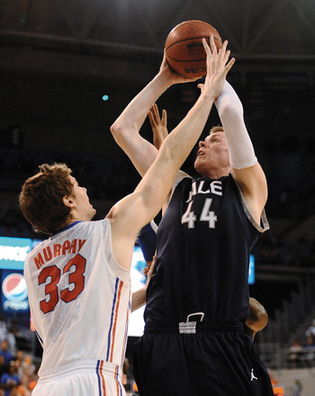 loading
loading
Sporting LifeHigh hopesYale's center looks to the NBA.  Associated PressYale center Greg Mangano ’12 battles Florida's Erik Murphy in December. View full image
The past season in Ivy League men’s basketball was Harvard’s year: the Crimson made their first appearance in the Top 25, went to the NCAA tournament, and, of course, basked in the improbable NBA rise of their alumnus, Jeremy Lin. But in that same winter, to far less fanfare, Greg Mangano ’12 capped one of the great careers in Yale history. This year, the 6'10" center averaged 18.2 points and established a school record for blocked shots in a career, earning a place on the All-Ivy first team for the second straight year. Mangano, who helped lead Yale to a 19–10 season (its best in a decade) has emerged as that rarest of Ivy League specimens: NBA prospect. “There’s been nobody like him,” says head coach James Jones. Mangano, a native of West Haven, Connecticut, started out as a hockey player, but as a gangly 6'5" 13-year-old, he decided to shift his focus to basketball. By the time he left high school, Mangano was a two-time all-state selection, but the late start had left parts of his game unrefined. “I can’t say it’s the most natural change, going from a hockey player to a basketball player, but he did it pretty well,” Jones says. “His position wasn’t something we needed at the time, but we took him because he was a local kid and we felt that he had a great upside.” The move couldn’t have worked out better. After spending his freshman year as a reserve and being slowed by a foot injury as a sophomore, Mangano broke out during his junior season, becoming the first Ivy Leaguer in 15 years to average ten or more points and ten or more rebounds per game. Last summer, he made the US team at the World University Games in Shenzhen, China, flourishing alongside teammates from Syracuse, Kentucky, and other top programs. “People just assume that guys in our league can’t play with those guys, and I wanted to prove to myself and to other people that I can,” Mangano says. “It did a wonder for my game.” Entering this past season, Jones feared his prized pupil might grow complacent when he returned to the modest ranks of the Ivy League. He showed Mangano a list of Ivy players who had starred as juniors but regressed the following year as opposing coaches got wise to their strengths. The mandate was clear: evolve or end up as another one-year wonder. Mangano began working with Jones to add new elements to his game, endeavoring to beat the double-teaming that inevitably harasses a high-scoring center. This season, Mangano upped his scoring average despite pressure from opposing defenses. Against traditional powers Wake Forest and Florida, which didn’t bother to guard him with a second defender, he combined for 46 points and 27 rebounds. “When teams didn’t double-team him this year, he was able to score at will,” Jones says. But scoring won’t be Mangano’s ticket to the NBA. Chris Dudley ’87, who spent 16 seasons in the NBA, left Yale seventh in career points, but he knew he had to show scouts something else to boost his stock in a league full of dynamic scorers. For Dudley, that meant showcasing his rebounding. For Mangano, it will likely mean defense and shot blocking. “You want to excel at something,” Dudley says. “You don’t want to just be average at everything. Coaches want to know they can rely on you for something.” Mangano is a long shot to be chosen in the June draft. But he will have opportunities to impress NBA talent evaluators before and after, and Dudley believes that Mangano, like the undrafted Lin, has the potential to convert Ivy League skeptics. “If you’re good enough, you can play anywhere,” Dudley says. “It doesn’t matter where anybody comes from.”
The comment period has expired.
|
|